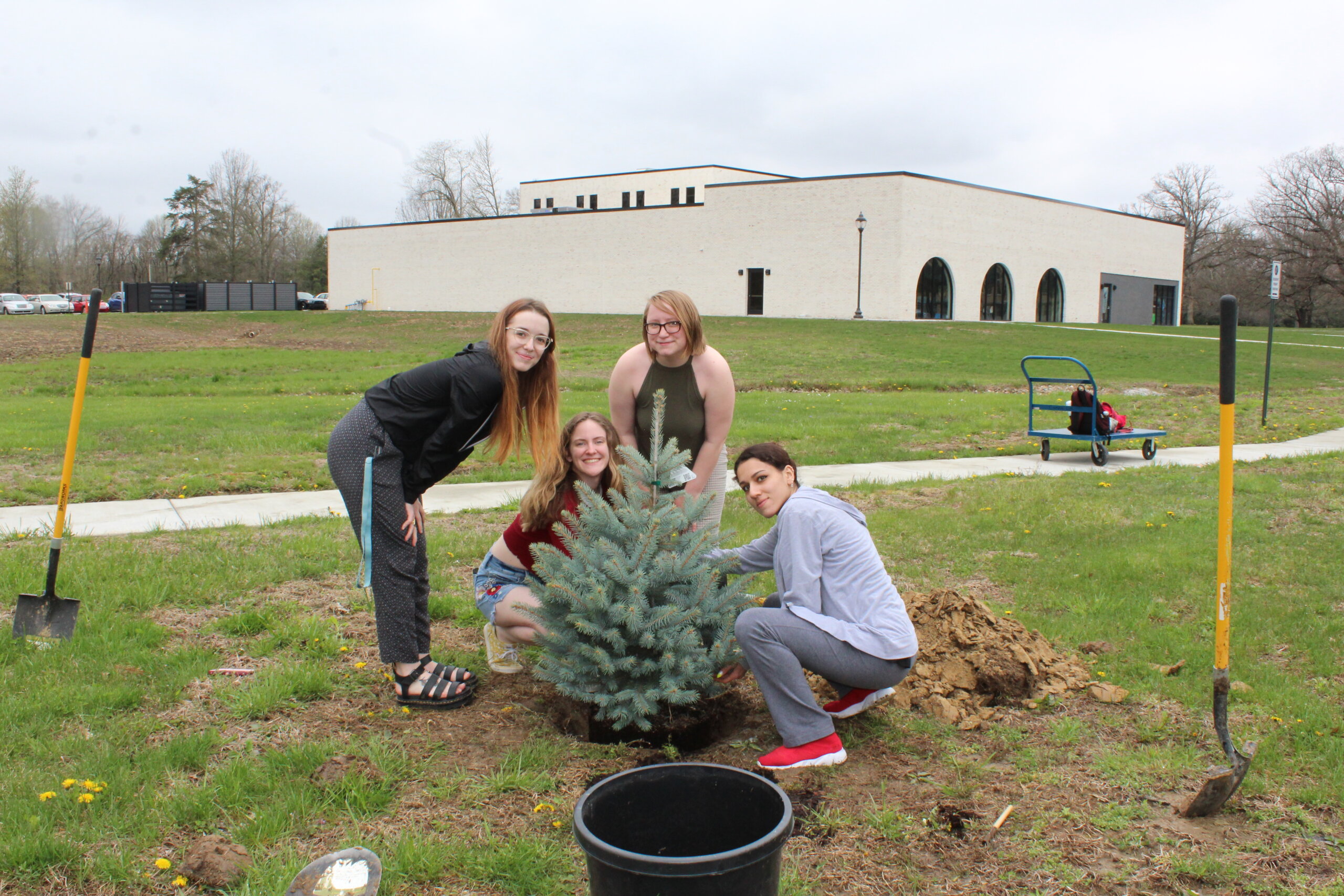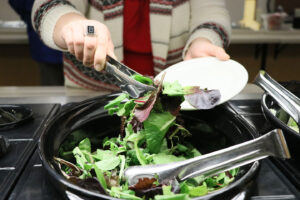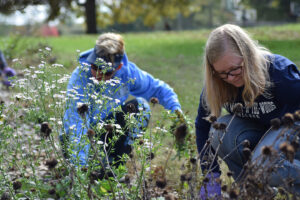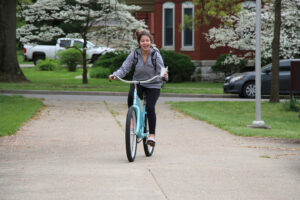
Sustainability at The Woods
Located on a wooded campus with sweeping views, gardens, grottos and lakes, sustainability is the heart of The Woods. It makes sense that sustainability is one of four core values for the College. SMWC students, faculty and staff are passionate about providing a campus environment that is Eco-friendly and make a concerted effort to build a sustainable future for our community and world.
Recycling Initiative and Organic Waste Management
SMWC and its partner, the Sisters of Providence, provide a full recycling program for the entire campus. Recycling has been a priority of the institution in an effort to reduce waste output and divert recyclable items from landfills. Recycling containers around campus accept paper, cardboard, plastics and shredded materials. SMWC students in the Sustainability Club are a major force for change and through their efforts, the campus was awarded a Coca Cola recycling bin grant of 75 recycling bins for collection of bottles and cans. In addition to regular recyclables, both SMWC and the Sisters of Providence recycle organic waste such as tree limbs and yard waste in a Biomass which converts organic waste into fuel or energy and further reduces the amount of waste diverted to landfills. Grass clippings are not collected. SMWC will add a single source collection site, which will accept drop off recyclables from the community.
Le Fer Lake
A long-term project at The Woods is the restoration of the Le Fer Lake. Following the dredging of the lake, repair of the dam and removal of an old bridge, SMWC committed to work with the Indiana Wildlife Conservancy to restore the lake water and surroundings as a habitat for native plants and wildlife. In addition to a new walking path, benches and picnic tables, an outdoor classroom will be built in 2019 to be utilized as an outdoor laboratory and learning space for students and summer camps.
Landscaping the Sustainable Campus (LSC) is a voluntary program of the Indiana Wildlife Federation designed to manage surface runoff, reduce excessive nutrient pollution, and add quality habitat space for wildlife on university and college property in Indiana. SMWC committed to participate in this program in 2018.
SMWC also committed in 2018 to the Indiana Wildlife Federation’s Sustainable Trail Certification (STC) program designed to encourage the development of trails into thriving habitat corridors which are easier to manage, offer a greater benefit to trail users and promote the conservation of local ecosystems through enriching human interaction with the environment.
Caps-to-Benches Program
The Caps-to-Benches Program, headed by the Sustainability Club, utilizes collected bottle caps to create useful benches, keeping the caps from becoming landfill waste. The first benches are set to be placed around campus in 2018.
 Trayless Dining
Trayless Dining
The Sustainability Club and the Greening of the Woods Committee introduced a trayless dining initiative in 2016 in the student dining hall, O’Shaughnessy Hall. Trayless dining is an effort in reducing overall water and energy consumption, food waste and the promotion of healthier eating habits. The College’s food service partner, Sodexo, is also helping the campus be sustainable by:
- Implemented the “Choose to Reuse” reusable meal containers and coffee cups for student, staff and faculty take away meals and drinks in 2018
- Uses some fresh, locally sourced produce from the White Violet Center on campus
- Using XpressNap recycled paper napkins as brown napkins have no bleach and can bio-degrade in landfills; using recyclable paper cups
- Using Apex dishwashing system designed to save water and energy, minimize packaging and chemicals in water supply
- Working with Restaurant Technology, a company that helps to reduce the amount of plant-based oil waste and then recycles the remainder
- Recycling aluminium cans and cardboard; working to begin a composting initiative
Water and Energy Consumption
SMWC offers students water refill stations for water bottles and reduced flow toilets in addition to the trayless dining initiative in an effort to conserve water. In an effort to reduce energy consumption, rooms and buildings which have been renovated or are new construction are fitted with lights that recognize when a room is not being used and turn themselves off. The Jeanne Knoerle Sports and Recreation Center, which opened in 2014, is built to Leadership in Energy and Environmental Design (LEED) certified specifications and is the first campus building to have all of these features in place.
Print Waste Reduction
In 2017, SMWC implemented a print management solution for networked printers and copiers. By requiring users to visit a printer or copier to release (print) their printed documents, print waste is significantly reduced when documents are not released. By reducing the number of documents printed, SMWC is making an impact on saving paper, toner and electricity.
Sustainability in the SMWC Curriculum
The SMWC General Studies program, Woods Core, includes the theme of sustainability at three points during an undergraduates’ education. he WC 100 classes “Into the Woods, Out of the Woods” serves as an introduction to the College’s core values, including sustainability. Students continue to explore sustainability in the context of religion and spirituality in the TH 200 class “Introduction to Religion and Spirituality.” And near the end of the Woods Core curriculum, students have the option of choosing the WC 402 class “Sustainability,” as their capstone course.
Launched in the Fall of 2014, SMWC offers an undergraduate major in Environmental Science and an undergraduate minor in Environmental Studies. These programs incorporate research on local plant and wildlife at the Le Fer Lake habitat and an ongoing academic and sustainable methods relationship with the White Violet Center of the Sisters of Providence. Environmental Science/Studies students are engaged in learning about local foods and sustainable growing methods and practices through the Passive Solar Greenhouse located in the midst of an organic farming operation. Students have an opportunity to work in the greenhouse and gain experience while learning and conducting important research. The Endowment for Sustainability was established in 2017 to help fund student-led initiatives with the White Violet Center. Starting in March 2019, the College will offer a graduate certificate in Sustainable Agriculture.
Today’s Women in STEM Tomorrow (TWIST) program offers overnight workshops, summer camps and full-day conferences to middle school aged girls to help encourage future careers in science, technology, engineering and mathematics. This program explores the concepts of sustainable practices and technologies and issues of the environment and sustainability.
 Pollinator Garden
Pollinator Garden
The pollinator garden is a cooperative project of the Science and Mathematics Department’s sustainability capstone and the Sustainability Club. The garden is planted with water-friendly and easy–to-manage Indiana native flowers and grasses which offer a foraging spot for wild pollinators such as honeybees, butterflies, and many species of wild birds.
Sustainable Landscape
SMWC is committed to reduced water usage in its landscaping and throughout its vast 67-acres grounds. The College launched a Grounds Turf Program in 2018 with a commitment to employ organic and sustainable practices whenever possible. As part of this program, the campus is sectioned into three zones – athletic, primary turf and meadows/fields – with high, medium and low maintenance. The College also has a commitment to limiting its usage of fertilizer and weed killer by only using it when necessary in high profile areas around buildings. Native Indiana plants are part of the campus landscape and offer homes for native wildlife, allowing for the plants to thrive in their natural environment rather than having to maintain the gardens through heavy water use.
 Pomeroy Pedals
Pomeroy Pedals
The Pomeroy Pedals bike share program promotes a healthy lifestyle and saves students and staff from wasting energy. This aids in conserving resources and helps to reduce the College’s carbon footprint. This program is part of the Pomeroy Wellness Initiative which promotes wellness through physical activity, healthy eating and a commitment to living a healthy lifestyle. The College actively works to refurbishing its bicycles to make this program even stronger.
Pomeroy Wellness
The Pomeroy Wellness Initiative is focused on personal health and nutrition, and also offers a great sustainable option for students, staff and faculty. From farm to table, the United Way’s Mobile Market and the Sisters of Providence’s Farm Store provide locally sourced farm-fresh fruits, vegetables and eggs on campus weekly. This initiative also encourages the campus community to get moving and participate in a yoga classes, ride one of the Pomeroy Pedals bikes, walk the Le Fer Lake Trail or work out in Club ’64 Fitness Center.
Tree Campus USA
SMWC is in the final process of becoming a Tree Campus USA. Headed as a student-led project and supported by the Greening the Woods Committee, SMWC has taken the first steps by initiating the first annual tree planting and Arbor Day Celebration in Spring of 2018! The Tree Campus designation requires campuses to meet five standards before being awarded the designation. SMWC is working hard on these requirements as a focus of its commitment to sustainability. Trees on campus can offer some fantastic benefits including reducing overall carbon footprint, the release oxygen into the atmosphere, a reduction in energy costs as a result of the natural heat-sink and the provision of a natural relaxing green space for the campus community enjoyment.
Committed to the Catholic Climate Covenant
Beginning with Saint John Paul in 1990, the Catholic Church has accepted the reality of human-forced climate change and expressed concern about the moral consequences of global warming. The Church has advocated for an international climate change agreement in response to this existential threat. The Paris Agreement is an international effort adopted by 195 nations and supported by the Vatican and the U.S. Conference of Catholic Bishops (USCCB). It recognizes that climate change represents an urgent and potentially irreversible threat to human societies and the planet and it establishes a framework to limit the increase in global average temperature to well below 2 °C above pre-industrial levels. In 2018, President Dottie L. King signed the Catholic Climate Covenant, a USCCB-supported organization whose mission is to inspire and equip people and institutions in the U.S. to care for creation and for the poor in response to Church teaching on climate change.
Get Involved!
Students, staff and faculty are welcome to get involved by joining in one of many sustainability efforts at the College:
- The Sustainability Club, a student organization, works on sustainable projects through the year, most notably its annual Operation Wabashiki and Ring Day St. Mary’s Road clean-up activities. This group also heads many initiatives such as the trayless campus program, grants for recycling, and the Caps-to-Benches Program. Read more about the Sustainability Club >
- The Greening the Woods Committee is a way for faculty and staff to join in and work hand-in hand with students in the Sustainability Club to bring sustainable changes and ideas to the SMWC community.
- Other ways you can get involved are:
- Watch water and energy consumption by turning off taps and lights!
- Recycle it! Place recyclables in bins and save caps
- Use a refillable water bottle instead of disposable bottles
- Take a bike on campus using one of the Pomeroy Pedals fleet
Think before you print something using one of the secure printers to save paper or choose not to print it!
 Trayless Dining
Trayless Dining Pollinator Garden
Pollinator Garden Pomeroy Pedals
Pomeroy Pedals